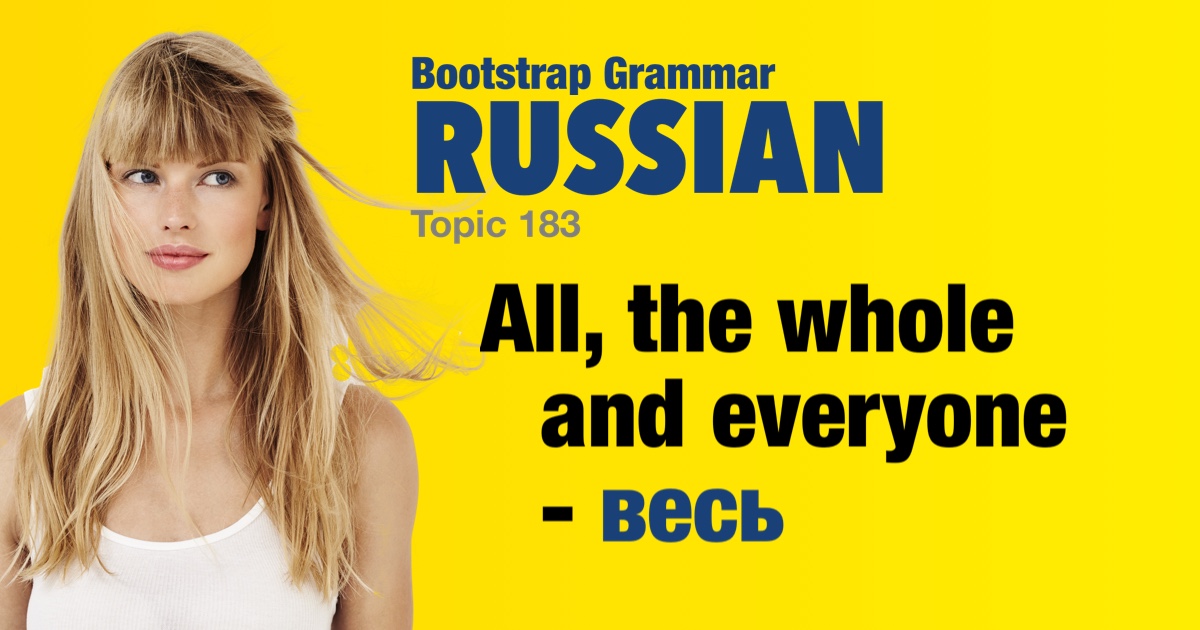Russian grammar - All, the whole and everyone - весь |
|||
|
|||
The very common pronoun весь means 'all or 'the whole' It is also used for 'everyone' as a contraction of все люди. It declines as follows: • Nominative: весь (masc.), всё (neu.), вся (fem.), все (plural) • Prepositional: всём (masc. & neu.), всей (fem.), всех (plural) • Accusative: всего (masc. animate), весь (masc. inanimate), всё (neu.), всю (fem.), всех (plural, animate), все (plural, inanimate) • Genitive: всего (masc. & neu.), всей (fem.), всех (plural) • Dative: всему (masc.), всему (neu.), всей (fem.), всем (plural) • Instrumental: всем (masc. & neu.), всей, всею (fem.), всеми (plural) |
| Examples: | |
|
Куда исчез весь хлеб?
Where did all the bread disappear to?
|
|
|
Мне не понравилась вся идея.
I (female) didn't like the whole idea.
|
|
|
Все лошади бегут по полю.
All the horses are running in the field.
|
|
|
Кто съел весь хлеб?
Who ate all the bread?
|
|
|
Он написал всё письмо сам.
He wrote the whole letter himself.
|
|
|
Они выпили всю воду.
They drank all the water.
|
|
|
Я не мог спать всю ночь.
I (male) couldn't sleep the whole night.
|
|
|
Ты всё забыл.
You (informal) (male) forgot everything!
|
|
|
Она сосчитала все звёзды на небе.
She counted all the stars in the sky.
|
|
|
Она хотела потрогать всех животных в зоопарке.
She wanted to touch all the animals in the zoo.
|
|
|
Они желают мира во всём мире.
They wish for peace in the whole world.
|
|
|
Я не уверен во всей идее.
I am not sure about the whole idea.
|
|
|
Он думает обо всём.
He thinks of everything.
|
|
|
Во всех городах есть пожарные депо.
There are fire stations in all towns.
|
|
|
У всех учеников будут книги.
All of the students will have books.
|
|
|
Мы купили продукты для всей семьи.
We bought food for the whole family.
|
|
|
У всего есть цена.
Everything has a price.
|
|
|
Её любовь к тебе больше всего мира.
Her love for you (informal) is bigger than the whole world.
|
|
|
Не верь всему, что слышишь.
Don't believe everything that (you) (informal) hear.
|
|
|
Я увидел книги, разбросанные по всей комнате.
I (male) saw books scattered about the whole room.
|
|
|
Я разошлю письма всем главным политикам.
I will send letters to all of the main politicians.
|
|
|
Всем девочкам пикник понравился.
All the girls liked the picnic.
|
|
|
Он всем понравится.
Everyone will like him.
|
|
|
Он сделал торт со всем сахаром.
He made the cake with all the sugar.
|
|
|
Директор поговорит со всеми сотрудниками.
The director will speak with all the employees.
|
|
|
Я знаком со всей книгой.
I am acquainted with the whole book.
|
|
|
Она дружит со всем классом.
She is friends with the whole class.
|
|
|
Вопреки всему она стала мамой.
Against everything (all odds) she became a mother.
|
|
|
Всё то, что я слышал о нем, было хорошо.
Everything that I (male) heard about him was good.
|
|
 |
|




